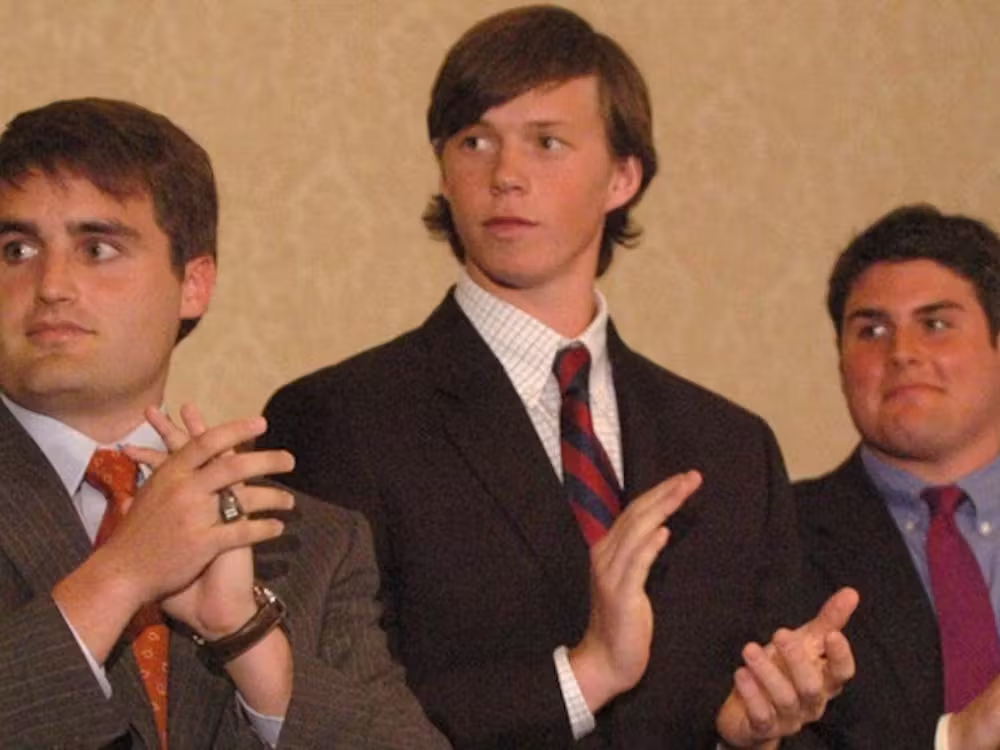Content warning: This article contains mentions of sexual assault and rape.
Crystal Mangum, the woman who falsely accused three Duke men’s lacrosse players of rape in 2006, admitted she lied about the allegations and asked for David Evans, Collin Finnerty and Reade Seligmann’s forgiveness.
Mangum made her confession in an interview published Wednesday on “Let’s Talk with Kat,” hosted by Katerena DePasquale, at the North Carolina Correctional Institution for Women. Unrelated to the lacrosse case, Mangum is currently in prison after being convicted of second-degree murder of her then-boyfriend in 2013.
“I testified falsely against them by saying that they raped me when they didn’t, and that was wrong, and I betrayed the trust of a lot of other people who believed in me,” Mangum said in the interview. “[I] made up a story that wasn’t true because I wanted validation from people and not from God.”
Then-N.C. Attorney General Roy Cooper did not prosecute Mangum for perjury after the case was dismissed, saying at the time that the investigators thought “she may have actually believed the many different stories that she has been telling.” The statute of limitations on perjury charges typically lasts two years in North Carolina law, meaning that Mangum can no longer be prosecuted for lying under oath.
Duke Athletics declined The Chronicle’s request for comment on Mangum’s statement. University administration, former University President Richard Brodhead, then-head men’s lacrosse coach Mike Pressler and Seligmann did not respond to The Chronicle’s request for comment in time for publication.
Mangum’s statement comes nearly two decades after she asserted that she was raped by the lacrosse players. Until now, she had never publicly stated that it was not true.
In her 2008 book “Last Dance for Grace: The Crystal Mangum Story,” Mangum wrote, “I will never say that nothing at all happened that night,” after which she provided graphic details of the alleged incident. However, she has told inconsistent accounts of the night throughout the past 18 years.
DePasquale added that when she initially contacted Mangum, she was not aware that Mangum wanted to apologize. However, Mangum expressed her desire to apologize to the players in her response to DePasquale’s request for an interview.
“It’s been on my heart to do a public apology concerning the Duke lacrosse case,” Mangum wrote to DePasquale in a letter obtained by The Chronicle. “I actually lied about the incident to the public, my family, my friends and to God about it, and I’m not proud about it.”
“When we met and were about to begin the interview, she made it clear that all she wanted to do is to apologize,” DePasquale wrote to The Chronicle. “It felt like this apology was something she needed to get off her chest.”
When Mangum’s allegations came to light in March 2006, many members of the Duke community — and the nation — believed her. Brodhead led a widely criticized administrative response, in which the University did not push back on antagonism towards the defendants from the Duke community.
Evans, Finnerty and Seligmann sued Brodhead and the University after their case was dismissed in April 2007, which came to an undisclosed settlement. They alleged that Brodhead repeatedly made false statements and conspired to deprive them of their right to a fair trial.
In a September 2007 statement, Brodhead characterized his response as causing “the families to feel abandoned when they most needed support.”
In the interview with DePasquale, Mangum repeatedly mentioned her relationship with God while in prison, invoking her faith in her call for forgiveness.
“I hope that [the players] can heal and trust God and know that God loves them and that God is loving them through me, letting them know that they’re valuable,” she said.
Mangum referred to the three accused lacrosse players as her “brothers,” saying they “didn’t deserve [the accusations].”
A look back on the case
The case brought against Evans, Finnerty and Seligmann surrounded the events of March 13, 2006. Mangum alleged that the three players raped her at a team house party on 610 N. Buchanan Blvd., where they paid to have two strippers — including Mangum — in attendance.
The allegations triggered a widespread national response from the media, which spent months on and around Duke’s campus.
Amid the national outcry, the University canceled the team’s March 25 game against Georgetown.
“We have done this in view of the situation we’re now in,” Brodhead said in a press conference following the game’s cancellation. “There are questions so grave that are in the air, that for us to continue to play would be inappropriate.”
Tensions heightened when an email written the night of the party by then-lacrosse player Ryan McFadyen was circulated, which joked about cutting the skin off of strippers. McFadyen later clarified that this statement was in reference to the movie “American Psycho.” The day the contents of the email were released, Pressler — who received death threats at the time — was asked to resign from his position as head coach by Brodhead. Pressler later successfully sued the University to void the resignation. Brodhead later moved to cancel the remainder of the season.
“We never found out who leaked McFadyen’s email [to the press],” said Chris Kennedy, senior deputy athletics director and then-senior associate athletics director, in a Sept. 13 interview with The Chronicle. “… Somebody got hold of that email chain, which [was] just among the team, and leaked it and had basically [taken] what [McFadyen] said out of context.”
Before and during the trial — the same period in which he was running for reelection — Mike Nifong, then-Durham County district attorney and lead prosecutor in the case, spoke openly to the press, saying in an March 2006 interview with CBS News that “there’s no doubt a sexual assault took place.”
Initially, Nifong said that the DNA would prove which players were innocent. However, once all of the tests came back negative, Nifong reversed his statement, noting that courts of law used to have to “deal with sexual assault cases the good old-fashioned way, [where] witnesses got on the stand and told what happened to them,” absent of DNA evidence.
Nifong was disbarred June 16, 2007, by the North Carolina State Bar for lying in court and withholding DNA evidence which ultimately absolved the defendants of responsibility for Mangum’s allegations. Evans, Finnerty and Seligmann’s lawsuit brought against Brodhead and Duke also condemned Nifong and his co-conspirators’ “tragic rush to accuse” and their “failure to verify serious allegations.”
Even though the charges against the players were dismissed in April 2007, the lives of those involved were permanently altered. Evans graduated in 2006, while Seligmann transferred to Brown University and Finnerty to Loyola University Maryland. Many journalists who reported on the case — including former Chronicle Editor-in-Chief Seyward Darby — appeared in ESPN’s 2016 documentary, “Fantastic Lies” to talk about the impact of the case.
In October 2008, Mangum addressed the public for the first time since the case.
“My only intentions were for justice, and I wanted justice for myself,” she said. In the speech, she did not admit that she had fabricated the allegations and continued to support the story told in “Last Dance for Grace.”
Sixteen years later, Mangum has a different story to tell.
“I don’t have any regrets,” she told DePasquale. “Everything happens to get everybody to the point where they are and it’s all to show God’s love and His forgiveness, His grace and His mercy.”
Signup for our weekly newsletter. Cancel at any time.
Dom Fenoglio | Sports Managing Editor
Dom Fenoglio is a Trinity junior and a sports managing editor of The Chronicle’s 120th volume.

Ranjan Jindal | Sports EditorRanjan Jindal is a Trinity junior and sports editor of The Chronicle’s 120th volume.

Sophie Levenson | Sports Managing Editor
Sophie Levenson is a Trinity junior and a sports managing editor of The Chronicle’s 120th volume.

Abby Spiller | Editor-in-Chief
Abby Spiller is a Trinity junior and editor-in-chief of The Chronicle’s 120th volume.





